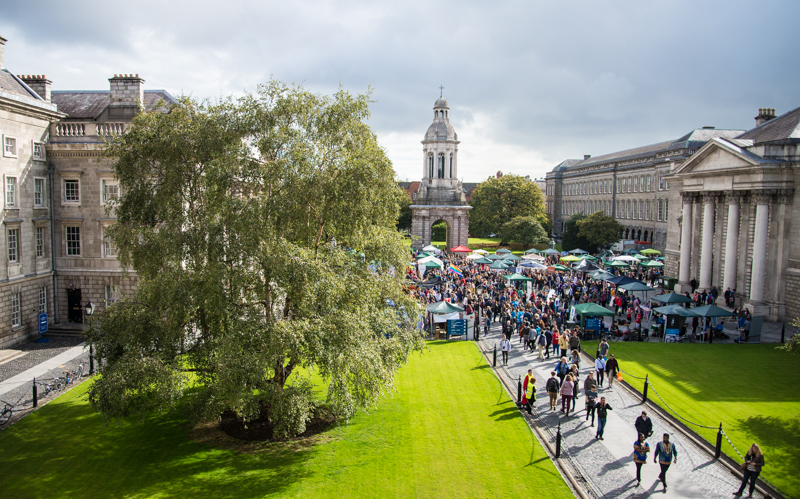Societies have seen a dip in new sign ups during this year’s freshers’ week, the Central Societies Committee (CSC) has said.
On the first day of freshers’ week, the CSC tweeted that there were “a whopping 8460 society memberships” in just one day.
However, individual societies are reporting a dip in numbers. The Society of International Affairs (SOFIA), for example, has seen a decrease in new sign ups from 290 members at the end of last year’s freshers’ week to 240 members this year. Similarly, DU History’s new recruits have dipped from 346 to 245 sign ups this year.
Due to the government restrictions, a traditional freshers’ fair with hoards of people and stalls lining Front Square was not possible this year. To lessen the blow to society membership and to allow first years to still enjoy society life in their first week, the CSC launched Trinity Societies Sign-Up Hub, a place where societies can upload content and students can join as many societies as they like using their card.
In an email statement to The University Times, the CSC said: “We’ve been blown away by the response to the week and we couldn’t be more proud and delighted.”
Although societies may have gained fewer new members so far, the CSC said it expects “over the coming weeks that society memberships will continue to rise”, adding: “Across the board we’ve seen a slight decrease in memberships but an uptick in active engagement, likely owing to the virtuality of it all.”
The usual practice of setting up a stall on campus and pitching societies to first years from freshers’ fair has become impossible due to the pandemic. Instead, societies have held “meet the committee” events and coffee mornings over Zoom.
DU Players, for example, has relied on in-person teaching and performing to facilitate collaborative theatre projects for years. However, this year it has had to make significant alterations to its approach to freshers’ week.
Ultan Pringle, who acts as both secretary of the CSC and chair of DU Players, said in an email statement to The University Times: “As of today we’ve had over 60 per cent. With the loss of the Fair this year, it makes sense for membership to decrease a little but we’re excited nonetheless by the idea that members who sought out and signed up to Players did so because of a genuine interest and enthusiasm for what we do and that’ll make for an exciting year for all of us.”
The CSC emphasised its commitment to “ensuring that society life in Trinity continues to thrive and prosper despite the challenges we face”, adding: “The next few months will require innovation and adaptation but after last week, we are in no doubt that Trinity societies are more than up to the task.”
In an email statement to The University Times, Secretary of Trinity Horse Racing Society, Robert Tolan, said that “numbers were higher than expected, about 5 per cent above expectations”.
“Numbers over the week were 10 per cent higher than last year, they picked up towards the end once we announced our first event with Japanese Soc and Korean Soc. Engagement was also higher than expected as roughly 30 people showed up to the event.”
He said that first year engagement was particularly good, citing a “strong correlation” between sign ups to the Equestrian Club and the Horse Racing Society. The committee was “pleased” by the number of sign-ups from international students.
The Horse Racing Society also emphasised the importance of the CSC’s help in making it a successful Freshers’ Week. “The supports from the CSC must be commended as there was constant engagement in the weeks prior to Freshers and throughout freshers’ week”, said Tolan.
Kate Maher, President of The University Philosophical Society (the Phil), said the society was “so surprised” at the success of freshers’ week. Maher said that she personally “was pessimistic that membership would fall dramatically or that people wouldn’t have an interest in attending online events, but [she] could not have been more wrong”.
The Phil, which is Trinity College’s largest student society, has had over 900 new members, which is “not far off” what they would usually emass in the first week of term, according to Maher.
Maher credited the Phil’s librarian, Katherine Potter, for the strong engagement, as Potter did much of the promotion for events. Maher also suspects that “the Phil’s reputation outside of Trinity” played a part.
In an email statement to The University Times, Dave Witte, secretary of QSoc, said: “Our Freshers’ Week experience was, overall, surprisingly positive.”
“We have had a lot of sign ups that definitely hold up to previous years and the attendance rate of our first online events was even higher than for most in-person events we have held in the past, getting up to 60 people to attend our ‘Get To Know Q Soc Coffee Hour’, which would have been impossible to achieve in a real-life setting.”
Many societies reported that freshers’ week in the time of coronavirus was not without its problems. Maher said that “the major challenge was obviously everything being so new”, adding: “The Phil as a society relies heavily on decades of institutional knowledge but we had to throw out the rulebook, which was a distressing concept but it worked better than I ever could have hoped for.”
In the same vein, Witte said: “It has been a challenge to switch to online-only activity, but we’re all learning quickly to adapt to the new circumstances.”







